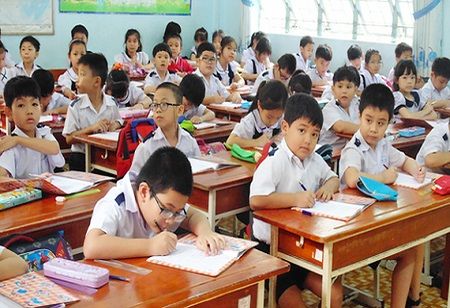The Ministry of Education and Training is now calling for public opinions on a proposal to abolish tuition fees for children studying at public kindergartens, primary, secondary and high schools. The move is set out in a draft resolution of the National Assembly, which seeks to exempt tuition fees from all levels of public general education, from preschool to upper secondary.
Based on the proposal, the State budget would be employed to subsidise preschool children and high school students studying at public kindergartens and general education schools, public continuing education centres and other public institutions which are applying the general education curriculum and self-financing their normal and investment spending.
The State budget would further be utilized to subsidize preschool kids and high school students in attending non-public kindergartens and general education schools, private and semi-public schools, which implement the national general education curriculum.
The upper limit of tuition support would depend on the ceiling level of fees charged by public institutions which have not yet gained full financial autonomy, decided annually by the provincial People's Councils. The ministry has suggested the new policy of exemption from tuition be effective from the 2025–26 academic year.
The ministry clarified that the draft resolution is meant to create a common 'no tuition fees' policy for public general education institutions, such as preschools, lower and upper secondary schools and reaffirm the current no-fee policy for public primary education, so that learners, at all levels in public schools, do not have to pay tuition.
Currently, under the 2019 Law on Education, only five-year-old children in public preschool, primary pupils and secondary students in public schools are legally exempt from tuition fees. The ministry said the policy would directly benefit citizens by easing financial burdens, especially for those in difficult economic circumstances. The savings on tuition could stimulate consumer spending on other goods and services, while also fostering public trust in the Government and the Party. The projected State expenditure arising from the policy is VNĐ8.2 trillion (US$316 million). Based on 2023–24 academic year data, Việt Nam has around 23.2 million students, according to the ministry's analysis. 21.5 million of them are in public schools (93 per cent) and 1.7 million are in non-public institutions (7 per cent).
Breakdown by level of education gives 4.8 million pre-school children (3.8 million public, one million private), 8.8 million primary school students, 6.5 million lower secondary school students and 2.99 million upper secondary school students.
The ministry determined funding requirements based on the lowest tuition levels set in Decrees No. 81/2021/NĐ-CP and No. 97/2023/NĐ-CP. Consequently, the overall yearly budget needed to cover students in public institutions with tuition waivers and offer financial assistance to students in private schools imparting the national general education curriculum is estimated to be around VNĐ30 trillion ($1.15 billion).
At the moment, State budgetary allocation for upholding tuition exemption for five-year-old pre-schoolers, primary students and lower secondary students stands at VNĐ22.5 trillion ($867 million) annually. Therefore, the extra budget required to apply the complete tuition-free policy, as the National Assembly resolution proposed, would be VNĐ8.2 trillion ($316 million).

